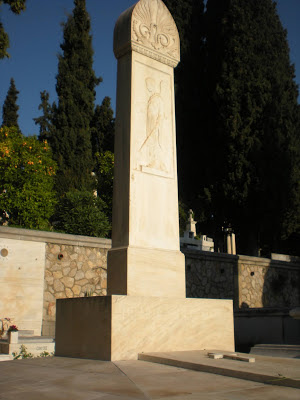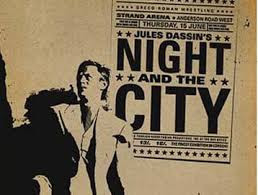Jules Dassin ΖΙΛ ΝΤΑΣΕΝ
Born December 18, 1911 Died March 31, 2008, Athens
Contributed by Dana Facaros
He wound up as one of the most famous people in Greece. Can you imagine this? I mean he was a kid from East Harlem in New York! He was a warm, gentle, funny man…
---Bruce Goldstein (1)
Plaza, Number 66
Jules Dassin, one of the great innovative film directors of the 20th century, worked with many of the big names in Hollywood throughout a long and varied career. A string of gritty black and white ‘slice-of-life’ films made his reputation before he was blacklisted during the McCarthy hearings. He spent most of his later years in Europe, where he made some of his best loved films including Never on Sunday (1960) which was key to introducing Greece, his future wife Melina Mercouri and the music of Manos Hadjidakis to the world.
Dassin’s documentary style makes his films, even the less successful ones, fascinating to watch today. They take us back decades to long lost visions of New York, San Francisco, London, Paris, and Piraeus. But his great ones are more than that: Combining realism and lyricism, they are as gripping and cathartic as the ancient tragedies that he loved.
Early Years
One of eight children of Odessa-born Jewish parents, Julius Moses Dassin was raised in New York City. Growing up poor during the Depression, not far from the massive wealth of New York’s one percent on Park Avenue, fired Dassin’s lifelong passion for social issues. Like his siblings, he worked to help support his family as soon as he old enough. (MGM later made up a pretty story that he had graduated from high school and spent two years training as an actor in Europe, to make him sound more important.) (2)
He did, however, learn Yiddish in order to join a progressive company of actors who performed in the Catskills and wrote scripts for radio shows and Broadway. He married Juilliard-trained violinist Béatrice Launer in 1937 and joined the Communist party, although he quit in disgust in 1939 because of the announcement of the pact between Hitler and Stalin.
Dassin realized his interest was behind, not in front of the camera and, thanks to his successes in New York, he won a six-month internship in Hollywood with Alfred Hitchcock. In 1941 his first successful film, The Tell-tale Heart, led to a seven-year contract with MGM.
But Dassin hated the studio system, considering it little better than slavery, and even went on a one-man ten-month strike against MGM before leaving for Universal. (3)
Between 1947 and 1950, he made his reputation with five powerful slice-of-life film noirs including Brute Force (1947) with Burt Lancaster about a violent prison revolt, and the New York crime drama The Naked City starring Barry Fitzgerald (1948). This last was the first film to be entirely shot on location.
Yet again, Dassin felt betrayed by studio meddling and went over to Twentieth Century-Fox, where he made Thieves’ Highway (1949), an intense film about extortion in the trucking industry in San Francisco. (4)
Moving to Europe and Five Tough Years
The equally gripping Night and the City, filmed in bomb-damaged London in 1950, starts with the low life petty criminal Harry Fabian (Richard Widmark) on the run – just like Dassin himself. Twentieth Century-Fox boss Darryl F. Zanuck had warned him to take the job and get out of Hollywood, fearing his name would come up at the McCarthy hearings. Subversively, Dassin made the bad guy Fabian the central character—another Hollywood first.
That same year Dassin was named by a fellow director before the House Un-American Activities Committee. Although he never was called to testify, Dassin knew his career in the US was over, and he, his wife and their three children moved to France.
The next five years without work were very hard. Dassin would get offers of work in Europe only to have them withdrawn at the last minute after threats from America warning that anyone involved with Dassin would never be able to work or show their movies again in the United States. Like other blacklisted figures, he survived by writing scripts under assumed names. If any American friends were near him in public, he would hide to spare them embarrassment. Only his friend Gene Kelly was brave enough to be seen with him. (5)
The Revival
Dassin’s career finally revived when he was offered the chance to make a low budget film from a French novel called Rififi Chez les Hommes in 1955.Thrilled to work again, Dassin managed to extract a script based around the jewellery robbery scene in the novel, and made it into the first ‘heist film’ with a daring suspense filled half hour without dialogue or music. It was a huge hit. François Truffaut wrote: Out of the worst crime novel I’ve ever read, Jules Dassin has made the best film noir I have ever seen.
American distributors offered Dassin a lot of money to take his name off the film, but when he refused, it became the first film distributed in the US with the real name of blacklisted director on the credits thus paving the way for the redemption of other blacklisted screenwriters and directors like Dalton Trumbo. (6)
Dassin the Philhellene
1955 was also the year when the Greek chapter of his life began.
He was at Cannes Film Festival for Rififi where he won the Best Director prize and where he met his future wife Melina Mercouri who was there for her first ever film role in Michael Cocoyannis’ Stella. Dassin, who had recently discovered the works of Nikos Kazantzakis and was planning a film based on his work, was so impressed with Stella, that asked her if she would play in his next film.
Melina would later write in I Was Born Greek (1971): It has always given me a pleasure to show Greece to people who come for the first time. It is as if you too see it for the first time, but there's no greater joy than to show Greece to the man you love -- especially when he falls in love with Greece.
The film was He Who Must Die (1957) based on Kazantzakis’ novel Christ Recrucified. (Ο Χριστός Ξανασταυρώνετα). Filmed by a French crew on location in Crete, it is one of Dassin’s seldom seen gems, - powerful and convincing in its premise that if Jesus were to return today, we’d crucify him all over again.
Dassin then wrote and directed Never on Sunday (1960). His budget was too small to hire an actor, so he co-starred himself. He later admitted that whenever he subsequently watched the film he always closed his eyes whenever he appeared, which is a bit harsh.
But Melina won the best actress gong at Cannes and Manos Hadjidakis won an Oscar for the music. Its joie de vivre made millions around the world long to visit Greece—in spite of it being nearly entirely filmed in black and white in the Piraeus ship yards.
In 1962 he followed this with a completely different film based on Euripides’s Phaedra a film set among Greece’s new royalty: its mega-wealthy shipping dynasties. Phaedra starred Melina, Raffaele Vallone, and Anthony Perkins, with music by Mikis Theodorakis. The love song from the film, Agapi mou with lyrics by Nikos Gatsos became another Greek hit. Dassin followed this with his first film in colour: Topkapi in 1964. It was another heist film, but this time a light-hearted caper based in Istanbul, with Melina, Maximilian Schell, Robert Morley and Peter Ustinov who won an Oscar for Best Supporting Actor.
1967: Marriage to Melina and The Military Dictatorship
After years together Jules, who had divorced from Béatrice in 1962, wed Melina in 1966 in New York where she was starring in his Broadway musical Ilya Darling, a production based on Never on Sunday. Then, In April 1967 the junta launched its April coup in Greece. The couple would spend the next seven years abroad in the forefront of the international campaign opposing the Junta.
Dassin made a few films during this period including Uptight (1968) in Cleveland, Ohio. It was after the assassination of Martin Luther King and its plot was based on Liam O’Flaherty’s The Informer and showcased an all-black cast. Next was Promise at Dawn in 1970 starring Melina as the Russian actress mother of Romain Gary. During the filming Dassin broke both legs in a freak accident. After the Polytechnic uprising in Athens in 1973, Dassin made the anti-junta film, The Rehearsal in 1974. It was shot in three weeks in a New York warehouse and involved Melina, Mikis Theodorakis, Olympia Dukakis, Lillian Hellman, Arthur Miller, Laurence Olivier and Maximilian Schell, but it was never released in cinemas: the junta had collapsed just a few days after the end of filming.
In 1974, Dassin and Melina returned to Greece, where she concentrated on her political career. Dassin would make two more films: the harrowing A Dream of Passion based on the story of Medea with Melina and Ellen Burstyn in 1978 and a real dud in Canada in 1980, A Circle of Two with Richard Burton and Tatum O’Neal. This was a year of personal tragedy. His eldest son Joe, who had played minor roles in several of his father’s films before becoming a beloved pop singer in France, died suddenly of a heart attack at the age of 42.
Kudos
Jules Dassin was made an honorary citizen of Greece in 1988 and continued working as a theatre director in Athens up until Melina’s death from lung cancer in 1994.
He founded the Melina Mercouri Foundation: (https://melinamercourifoundation.com/en/), dedicated to preserving her work and promoting her most passionate cause, - the return of the Parthenon Marbles. He died just a few months before the opening of the new Acropolis Museum which had been designed to house them and he was buried next to Melina. Then prime minister Costantinos Karamanlis eulogized him:
Greece mourns the loss of a rare human being, a significant artist and true friend. His passion, his relentless creative energy, his fighting spirit and his nobility will remain unforgettable.(7)
The Map
An Afterword
Some of Dassin’s films are available for free online:
[Brute Force](https://www.dailymotion.com/video/x1zny4j)(Ο Δήμιος των Κολασμένων)
[Naked City](https://www.youtube.com/watch?v=Qz4aEfOJGfY)(Γυμνή Πόλη)
[Thieves’ Highway](https://www.youtube.com/watch?v=4t4sj4G63no)(Η Λεωφόρος των Κλεφτών)
[Night and the City](https://www.youtube.com/watch?v=pFnpoaRHpfA)(Η νύχτα και η Πόλη)
[Never on Sunday](https://www.youtube.com/watch?v=GLtGEM1fct8)(Ποτέ την Κυριακή)
[Phaedra](https://www.dailymotion.com/video/x21iyuq])(Φαίδρα)
[Uptight](https://www.youtube.com/watch?v=waZLHsSoPC8)
Footnotes
1. Bruce Goldstein in a 2018 interview (https://www.youtube.com/watch?v=3a9OCqwHu28)
2. Interview for Télérama, 10 July 1999 [http://www.cinememorial.com/acteur_Jules_Dassin_697.html].
3. French TV Interview [1972 https://www.youtube.com/watch?v=jPbTH39Zl9I]
4. Thieves’ Highway: Dangerous Fruit [https://www.criterion.com/current/posts/354-thieves-highway-dangerous-fruit]
5. Jules Dassin interview [https://www.youtube.com/watch?v=j2F31S8Zm1w]
6. Fresh Air interview, 2001 [https://www.youtube.com/watch?v=JXJ0Z63-JB0]
7. Wikipedia, Jules Dassin

















Δεν υπάρχουν σχόλια:
Δημοσίευση σχολίου